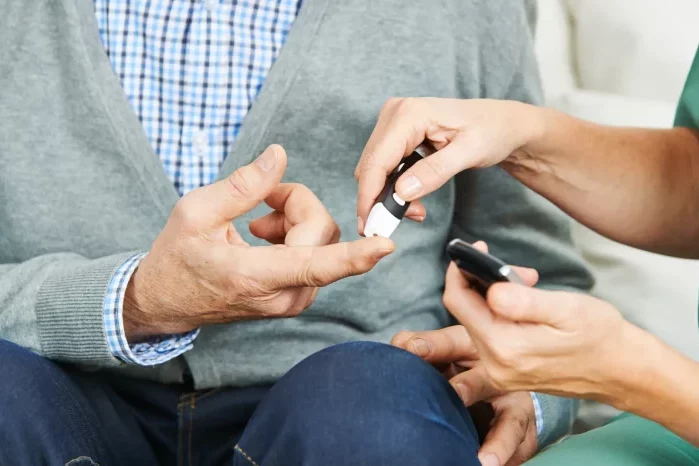Managing blood sugar levels is crucial for individuals with diabetes, and regular blood sugar monitoring is a cornerstone of effective diabetes management. One of the most important times to measure blood sugar is in the morning, as fasting blood glucose levels can provide valuable insights into how well your diabetes is being managed overnight and how your body is responding to your medication, diet, and lifestyle choices.
For people with diabetes, understanding when and why to test your blood sugar in the morning is essential. Whether you are newly diagnosed or have been living with diabetes for years, knowing the optimal time to test and what the results mean can significantly impact your ability to control your blood sugar levels and prevent complications.
In this article, we will explore the importance of morning blood sugar testing, the best times to test, factors that affect morning blood sugar readings, and tips on how to interpret and manage your morning glucose levels. By the end, you will have a comprehensive understanding of how to monitor your blood sugar effectively in the morning to improve your overall diabetes management.
Why Morning Blood Sugar Monitoring is Crucial
Blood sugar levels fluctuate throughout the day, influenced by food intake, physical activity, medications, stress, and even sleep. However, the most consistent and crucial time to monitor your blood sugar is in the morning, specifically upon waking, for several key reasons:
Fasting Blood Sugar Measurement: Morning blood sugar levels, often referred to as “fasting blood glucose,” reflect your body’s baseline blood sugar levels after a night of fasting, typically 8-12 hours without food. This value is important because it provides insights into how your body manages glucose during periods of fasting when insulin production should ideally keep blood sugar levels in check.
Baseline for Diabetes Management: Testing in the morning offers a baseline to help determine how well your medications, diet, and lifestyle changes are working overnight. This is particularly important for individuals with type 2 diabetes, as insulin sensitivity may be lower in the morning. Monitoring fasting blood glucose allows you to track how well you are managing your condition and whether adjustments to your treatment plan are necessary.
Insight into Insulin Sensitivity and Resistance: For those with insulin resistance (a hallmark of type 2 diabetes), blood sugar levels in the morning may be higher than desired due to the body’s inability to efficiently use insulin overnight. By consistently measuring morning blood glucose levels, you can gauge how well your insulin regimen is working and whether any adjustments need to be made.
Prevention of Morning Hyperglycemia: Some individuals with diabetes experience “Dawn Phenomenon,” a natural increase in blood sugar levels during the early morning hours, usually between 3 a.m. and 8 a.m., due to hormonal changes. Morning testing can help identify this phenomenon and provide insights on how to manage it, such as adjusting medication or meal timing.
Tracking Progress Over Time: Regular morning testing can help track the progress of your diabetes management over time. For people with type 1 diabetes, it can reveal trends in insulin requirements and inform adjustments to insulin therapy. For people with type 2 diabetes, it can indicate how well lifestyle changes such as diet, exercise, and medication are controlling blood sugar.
When is the Best Time to Test Your Blood Sugar in the Morning?
The timing of morning blood sugar testing is just as important as the frequency. Testing at the right time ensures that you get the most accurate and meaningful results. Here are some key considerations when determining the best time to test your blood sugar in the morning:
1. Right After Waking Up (Fasting Blood Glucose)
The most common time to test blood sugar in the morning is right after you wake up, before you eat or drink anything. This is referred to as fasting blood glucose. The goal is to capture your blood sugar levels after an overnight fast to assess your body’s ability to maintain stable blood sugar levels without the influence of food.
Why test right after waking up?: When you wake up, your blood sugar is typically at its lowest point, having been unaffected by food intake for 8-12 hours. Testing immediately after waking up ensures you’re measuring your true baseline blood glucose levels without the influence of breakfast or other factors.
Ideal Range for Fasting Blood Glucose: According to the American Diabetes Association (ADA), a normal fasting blood glucose level for someone without diabetes is between 70 and 100 mg/dL (3.9 to 5.6 mmol/L). For people with diabetes, the target range for fasting blood glucose is typically between 80 and 130 mg/dL (4.4 to 7.2 mmol/L), though individual goals may vary based on treatment plans and physician recommendations.
2. Before Breakfast (Pre-Meal Blood Sugar)
For individuals who eat breakfast shortly after waking, another key time to test blood sugar is just before eating breakfast. This test helps determine how your blood sugar levels are trending before the influence of any food. While this is very similar to testing right after waking up, it allows you to observe how stable your blood glucose is without any food intake.
Why test before breakfast?: Testing before breakfast helps track whether your blood sugar levels are elevated in the morning, even before food. If blood glucose is higher than expected, it may indicate an issue with insulin sensitivity, insulin resistance, or issues related to your overnight insulin regimen.
3. Before and After Medications
Many individuals with diabetes take medication or insulin in the morning, and testing blood sugar levels before and after taking these medications can provide valuable information on how well the medication is working and how it affects blood sugar levels.
Why test before and after medications?: By testing before and after taking diabetes medications, such as metformin or insulin, you can track how effectively your treatment is managing your blood sugar. This allows for more personalized adjustments to medication dosages and helps optimize treatment efficacy.
4. After the Dawn Phenomenon (Dawn Effect)
As mentioned earlier, the Dawn Phenomenon refers to an early morning rise in blood sugar due to the release of growth hormone, cortisol, and other counter-regulatory hormones. This typically occurs between 3 a.m. and 8 a.m., causing blood sugar levels to rise naturally.
Why test after the Dawn Phenomenon?: If you suspect you are experiencing dawn phenomenon, it may be useful to test blood sugar after waking and after breakfast. The goal is to determine if your blood glucose levels are elevated due to natural hormonal fluctuations or whether other factors (such as food or insulin resistance) are contributing to the rise.
Managing the Dawn Phenomenon: If you notice consistent morning hyperglycemia, it may be worth adjusting your medication regimen or the timing of insulin administration to counteract the effect. For example, taking long-acting insulin at night may help reduce the effects of the dawn phenomenon.
Factors That Affect Morning Blood Sugar Levels
Several factors can influence your morning blood sugar levels, and understanding these can help you interpret your test results accurately. Here are some key factors that may affect your morning readings:
1. Diet and Evening Snacks
What you eat the evening before can have a significant impact on your morning blood sugar levels. Consuming a large or carbohydrate-heavy meal close to bedtime may cause elevated blood sugar levels upon waking.
Evening Carbs and Sugar: A large amount of carbohydrates or sugar at dinner or late-night snacks can cause delayed increases in blood glucose levels, especially if you don’t have adequate insulin coverage overnight.
Late-Night Eating: Eating right before bed can disrupt your fasting blood glucose levels by causing a spike in blood sugar late at night, which may continue into the morning.
2. Exercise
Physical activity influences insulin sensitivity and glucose uptake in muscle cells. If you exercise late in the evening or early in the day, it may lower your blood sugar levels, especially if you take insulin or medication that lowers blood glucose.
Impact of Exercise: Exercise, particularly intense or prolonged activity, can lower blood glucose levels in the morning, especially if you take insulin or other medications. Conversely, lack of activity or a sedentary lifestyle can lead to elevated morning blood sugar levels.
3. Medications and Insulin
Certain medications, including insulin, may affect your blood sugar levels in the morning. If you take long-acting insulin or other diabetes medications before bed, they can help control blood sugar levels overnight.
Medications: The timing, dosage, and type of medication you take (whether oral or injectable) will affect your fasting blood glucose. For instance, long-acting insulin taken before bed may help prevent early morning high blood sugar levels.
4. Sleep and Stress
Sleep quality and stress can significantly affect morning blood sugar levels. Lack of sleep or high levels of stress increase cortisol production, which can result in higher blood sugar levels in the morning.
Stress: Emotional and physical stress can trigger the release of hormones such as cortisol and adrenaline, which can increase blood sugar levels. Managing stress levels through relaxation techniques or lifestyle changes can help regulate morning blood glucose levels.
5. The Dawn Phenomenon
As previously mentioned, the dawn phenomenon occurs due to the release of growth hormone and other counter-regulatory hormones in the early morning hours. This natural process can lead to elevated blood sugar levels, particularly in individuals with insulin resistance or type 2 diabetes.
Managing the Dawn Phenomenon: For those experiencing dawn phenomenon, adjustments to insulin timing, diet, or medication may be necessary to manage early morning blood glucose levels.
Interpreting Your Morning Blood Sugar Results
Understanding your morning blood sugar readings is crucial for adjusting your diabetes management plan. Here’s how to interpret your morning results:
Low Blood Sugar (Hypoglycemia): If your fasting blood sugar is below 70 mg/dL (3.9 mmol/L), it may indicate hypoglycemia. This can be caused by excessive insulin, skipping meals, or increased physical activity. If you experience symptoms such as shakiness, sweating, or dizziness, it is important to treat hypoglycemia promptly.
Normal Blood Sugar: A fasting blood sugar level between 70 and 130 mg/dL (3.9 to 7.2 mmol/L) is typically considered normal for someone with diabetes, though individual goals may vary.
High Blood Sugar (Hyperglycemia): If your fasting blood sugar is consistently above 130 mg/dL (7.2 mmol/L), it may indicate that your blood glucose levels are not well controlled. Persistent high blood sugar levels can increase the risk of complications, so it’s important to work with your healthcare provider to adjust your treatment plan.
Conclusion
Testing blood sugar in the morning is a critical component of managing diabetes effectively. By understanding when to test and how to interpret your results, you can gain valuable insights into how your body responds to fasting, food, medications, and other factors. Morning blood sugar monitoring provides a clear picture of your overall diabetes management and helps guide adjustments to medications, diet, and lifestyle.
For accurate and effective blood sugar control, regular monitoring, along with a comprehensive understanding of the factors influencing your blood sugar levels, will help ensure better health outcomes. Always work with your healthcare team to personalize your testing schedule and diabetes management plan for optimal results.
Related topics:



























